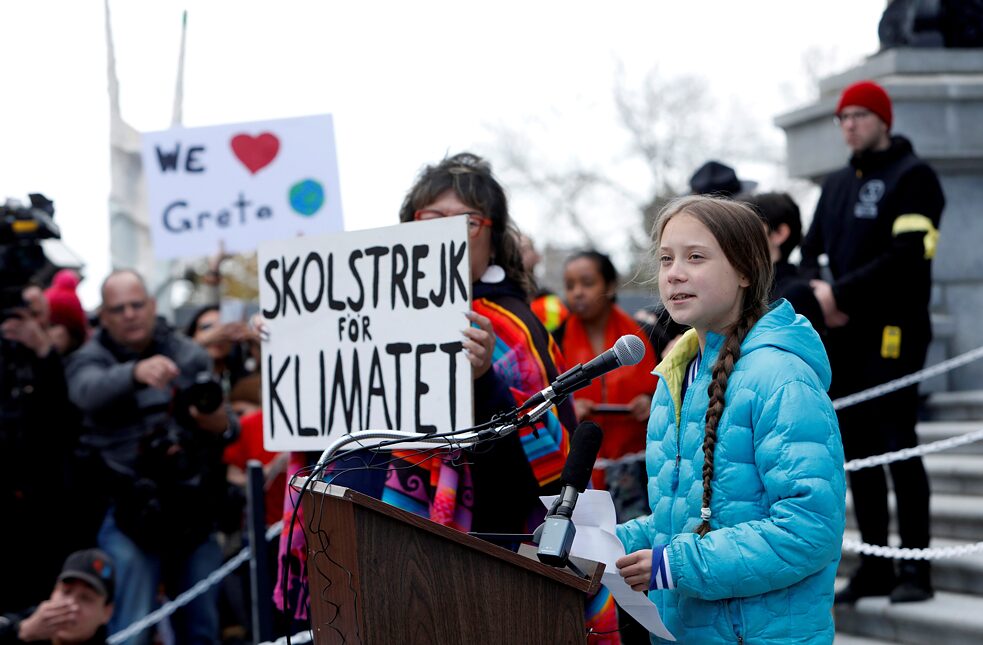Climate Change Deniers
“Climate Is Really Just Weather”

Climate is really just weather and lower heating costs are a good thing: a look into the world of climate change deniers in which facts are pretty much beside the point.
By Stefan Schocher
There is a lot of talk about lies. A lot of talk about the freedom some take in inflicting their will on others. About control from the outside, communism and fascistoid thinking from “those at the top” looking to gag and subjugate “all of us at the bottom”. “Believe nothing – verify yourself” is the motto of wahrheiten.org (truths.org). If you believe the website, pretty much everything is a lie: money, the climate, cancer, evolution, the Federal Republic of Germany. From the menu, users can choose between information about the “vaccination hoax”, the “9/11 hoax” and the “climate hoax” while bears the provocative subtitle “the greatest lie of the century?”
Facts are beside the point in the world of people who view climate change as the invention of a secret cabal rather than an ecological reality. And the scene is growing increasingly organized. Wahrheiten.org is just one of many websites, blogs and online communities climate change deniers use for networking. In the USA, a whole host of conservative think tanks do their best to refute the scientific findings on climate change. The British Global Warming Policy Foundation counts a number of conservative members of the House of Lords among its representatives. As such, the views of climate change deniers have now made it onto the front benches of politics. In the German Bundestag, right-wing AfD (Alternativ für Deutschland, Alternative for Germany) politicians repeatedly reject the idea of human-caused climate change, while in Austria populist FPÖ (Freiheitliche Partei Österreichs, Freedom Party of Austria) is the primary driver behind climate change denial. In September 2019, FPÖ boss Norbert Hofer took aim at Greta Thunberg, accusing her of leading a “pigtail dictatorship,” and garnering praise from followers including users of Austrian unzensuriert.at (uncensored.at) for his supposed courage in saying “what many have been thinking”.
Climate Debate? What Climate Debate?
When Edgar Gärtner talks about Greta Thunberg, he calls her “a poor girl” being exploited by her parents and politicians. Gärtner is an author, speaker and board member at climate change denier EIKE “Europäisches Institut für Klima & Energie” (European Institute for Climate and Energy). The name is misleading, as EIKE is not a scientific institute. Its self-appointed mission is to serve as a platform for people who reject “human-caused climate change”, which its website refers to a “scam perpetrated against the population”. EIKE is a key player among German climate change deniers and organizes an annual conference where the like-minded can network.
 Talking about Greta Thunberg, Sarah Kessler says no young woman had ever had such a powerful influence and been subject to such scrutiny in the public eye before. People from different walks of life seem to resent the fact that a young woman who has flouted every convention and hierarchy in political discourse is attracting so much attention.
| Photo (detail): © picture alliance / REUTERS
Edgar Gärtner maintains a cool facade while he expresses claims about supposed networks in “monetary interests, politics and industry”. In his view, there is no climate debate because there is no debate of any kind. He accuses the Intergovernmental Panel on Climate Change (IPCC) of “consolidating institutional powers” through indoctrinating the representatives governments send and guiding the work of lobby groups. Talk turns quite quickly to claims that debate is “being blocked at the very top”, that “monetary interests” are suppressing contrary opinions on climate change, that a subconscious suicidal inclination is driving people to protest in the streets, and that Europe will soon be a Chinese colony.
Talking about Greta Thunberg, Sarah Kessler says no young woman had ever had such a powerful influence and been subject to such scrutiny in the public eye before. People from different walks of life seem to resent the fact that a young woman who has flouted every convention and hierarchy in political discourse is attracting so much attention.
| Photo (detail): © picture alliance / REUTERS
Edgar Gärtner maintains a cool facade while he expresses claims about supposed networks in “monetary interests, politics and industry”. In his view, there is no climate debate because there is no debate of any kind. He accuses the Intergovernmental Panel on Climate Change (IPCC) of “consolidating institutional powers” through indoctrinating the representatives governments send and guiding the work of lobby groups. Talk turns quite quickly to claims that debate is “being blocked at the very top”, that “monetary interests” are suppressing contrary opinions on climate change, that a subconscious suicidal inclination is driving people to protest in the streets, and that Europe will soon be a Chinese colony.
Edgar Gärtner does not deny that the climate is changing; he welcomes it because “heating costs are falling”. He simply takes issue with who is responsible. And he is not happy with what he thinks are the forces driving climate policy: a lobbying policy that has destroyed the German automotive industry and as such jobs.
On social media and like-minded forums is it just an argumentative hop, skip and a jump from the “clientele-climate policy” of the “ecological mafia” that is “taking us to the cleaners” to US monetary interests right-wing blogs like freiewelt.net (freeworld.net) depict as the major beneficiaries of climate policy. Der Klimaschwindel – wie die Ökomafia uns abzockt (The Climate Change Hoax – How the Ecomafia is screwing us) is a standard title among climate change deniers. On related sites, these sorts of accusations are often mixed with antisemetic, antidemocratic and anti-media undertones.
Driven by Mistrust
The spectrum of climate change deniers – or “climate change sceptics”, as many call themselves, is wide. It runs the gamut from business and industry circles who are likely to be primarily driven by self-interest, to think tanks and political circles of neoliberal, alt right and far-right populist groups and people who find conspiracy theories attractive. Some completely deny global warming, while others admit that temperatures are rising, something they attribute to either non-human causes or see as a problem with no solution. Some mistrust official figures, others only doubt the efficacy of efforts to address it. What unites them is their staunch opposition to climate policy.
Sarah Kessler, a researcher at Ludwig-Maximilians-Universität München, explores why climate change is such a polarizing topic. She has identified a continual spiral of polarizing debates climate change is imbedded in, starting with the Greece crisis, followed by migration, and then CO2. Kessler has uncovered two separate lines of discussion in the debates with very little interaction. One is the public discourse in TV talk shows, the mass media and the wider public, the other the conversations primarily taking place on social media and corresponding forums. In the latter, one clear motive seems to drive participants: the idea that a political elite is making decisions without consulting citizens and not following the very rules it sets. According to Kessler, this is exacerbated by the fact that climate change is incredibly complex, that there is very little a single individual can do, and that the problem is hardly visible or tangible in any way. These factors all come together to engender in deep mistrust and a fear of loss.
In politics, right-wingers in particular are promoting the arguments put forth by climate change deniers. The German AfD parliamentary group has jumped on board with Austria FPÖ. While AfD party leader Meuthen does not claim to be a climate change denier, he is certainly a sceptic. The party calls climate protection policies “folly” and its programme questions the IPCC’s assumptions at least in part. Head of the parliamentary group Alice Weidel has called the committee “a political, not a scientific organization”, which she claims means the debate is “nothing more than lobby politics”.